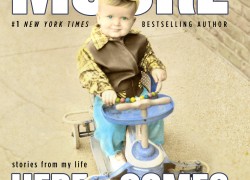
Few men are as reviled as Michael Moore. The director of Bowling for Columbine, Fahrenheit 9/11, and Sicko has made himself notable not only for his Oscar nominations but also for the incredible hate he has inspired in countless conservatives. Even the Democratic Party has a strained relationship with the documentarian. Among the top search hits for Moore’s name is a website dedicated to exposing Moore’s lies and excesses. The director has even claimed that he has received numerous death threats.
But Moore can take comfort that there is one man who remains loyal to him, one man who knows the truth of Moore’s life long crusade to fix the United States: Michael Moore.
Moore’s belief in his own specialness is on full display in his recent memoir, Here Comes Trouble. The book focuses mainly on his early life growing up in Flint, Michigan and his perspective on the political and social events that defined the Baby Boomer generation. The book is essentially an anthology of Moore’s favorite stories from his life, ranging from the brief period he was on the path to a Catholic priesthood to his election to the local Board of Education at only eighteen.
Ignoring Moore and reading the memoir only as a collection of short stories rather than an autobiographical account of Moore’s life, Here Comes Trouble is an engaging and frequently touching read. A note from the author even admits the odd semi-fictional nature of the book. Names have been changed, events slightly altered, and winners and losers in every story clearly defined. With this in mind, and one’s own knowledge of the present Michael Moore pushed aside, there is a charming Forrest Gump quality to the book. The major events of the last 50 years are suddenly seen through the eyes of a child, a teenager, and a young adult.
The brief moments of brilliance in his memoir occur when Moore accepts his peripheral role in history. In those few stories where the winners and losers are ambiguous, Moore’s ability to hone in on the emotional impact of events is impressive. The chapter dedicated to his mother’s death is the most moving by far. There is anger, frustration, deep sadness, and not an instance of the author asserting his own superiority. For a moment, the reader is allowed to get to know Michael Moore the man.
But sadly these moments are few and far between. Too often Moore writes as if he has something to prove, and he forces the idea that he has tirelessly worked to improve the United States far too often to be convincing. Instead of the humble appreciation that is expected in most memoirs, Moore has no qualms about pointing out his own success. The person he portrays in the book is more saint than man, and more tiresome than entertaining.
The example that jumps to mind is perhaps one of the less innocuous instances in the book, but still typifies the book’s nauseating self-promotion. Moore writes in one chapter about his time running the Flint Voice, an alternative newspaper in his hometown with an emphasis on muckraking. Moore describes how the local government went after the small paper, even raiding the newsroom to find incriminating evidence, only to find itself with a massive public relations problem.
Alone, this story is interesting, albeit somewhat self-aggrandizing. But it is the aftermath of the incident that is truly grating. Moore gleefully recounts receiving a personal call from John Lennon, who allegedly indicates that he wants to do some sort of benefit for the small paper as a sign of solidarity. And while an interesting moment, Moore’s account of Lennon’s subsequent death dwells more on the tragedy of the singer not helping Moore than the tragedy of the death itself. The conclusion makes the reader wonder whether Moore included the story simply to associate himself with a Beatle and once again display his saintliness.
Indeed, there are few chapters where Moore is not the hero. In one, he publicly condemns the Elk Club for its racism as only a young man and receives national attention. In another chapter, which seems more of a pat on the back than an exploration of a formative experience, he explores how he rescued a friend after a botched abortion.
This is not to say that Moore’s memoir is uninteresting or poorly written. Indeed, most of the stories are engaging, humorous, and on rare occasions even inspiring. But what they lack is the feeling of reality. Moore paints his characters with too broad a brush, his own role as hero forced on the audience in every story. Readers will learn little more than they already knew, that Michael Moore is his own biggest fan.
The dedication to the book is ultimately the best warning to readers. “For my mother,” Moore writes, “who taught me to read and write when I was four.” Even in a moment of thanks, he simply cannot resist pointing out who the smartest man in the room is.
